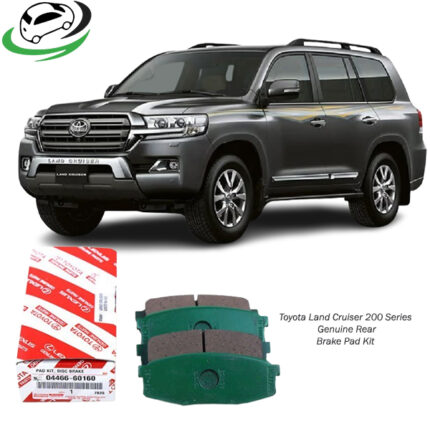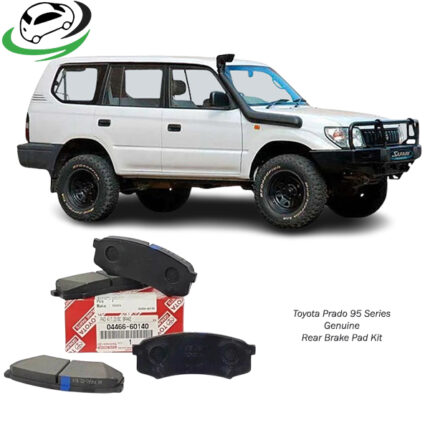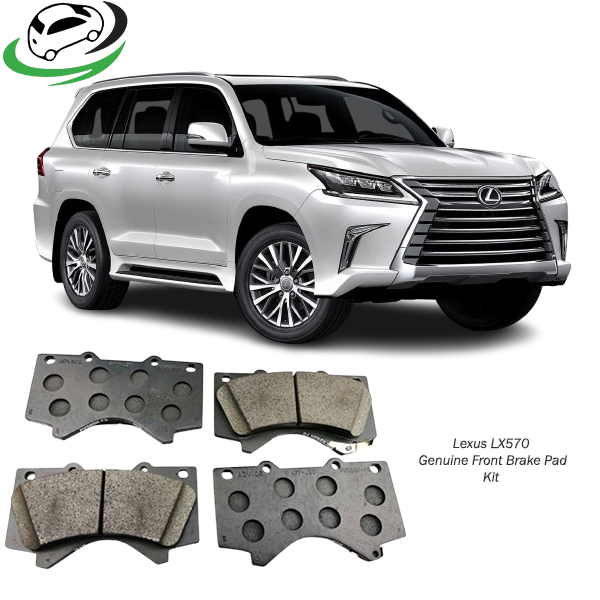-11%
Get Lexus LX570 Genuine Front Brake Pad Kit 0446560280
When it comes to vehicle safety, few components are as crucial as the braking system. Among the vital parts of this system, brake pads play an essential role in ensuring your vehicle can slow down or come to a complete stop effectively. Front brake pads, in particular, are often under more stress than rear ones due to the weight distribution during braking, making their performance even more critical. This comprehensive guide will walk you through the functions, benefits, and maintenance of genuine front brake pads, shedding light on why opting for genuine parts is key to safety and longevity.
Function of Front Brake Pads
Front brake pads are designed to create friction when pressed against the brake rotors, slowing the wheel’s rotation and ultimately bringing the vehicle to a stop. Brake pads are part of the disc braking system, consisting of several components working together: the brake pedal, master cylinder, brake calipers, rotors, and pads. When you press the brake pedal, hydraulic fluid from the master cylinder is compressed, pushing the brake calipers against the rotors, with the brake pads providing the necessary friction to stop the wheels.
The primary functions of front brake pads include:
- Generating Friction: Brake pads are made from a high-friction material that creates resistance against the brake rotors, converting kinetic energy into heat and slowing the vehicle.
- Even Wear Distribution: Front brake pads are typically larger and thicker than rear brake pads because the front of the vehicle bears more weight during braking, especially when stopping from high speeds. This ensures that the force is evenly distributed, preventing brake fade or failure.
- Heat Management: As the pads create friction, significant heat is generated. Good-quality brake pads are designed to handle high temperatures without breaking down or losing effectiveness, maintaining optimal stopping power.
Benefits of Genuine Front Brake Pads
While aftermarket brake pads may come with a lower price tag, opting for genuine brake pads ensures superior performance, safety, and long-term cost-effectiveness. The advantages of genuine brake pads include:
1. Optimal Safety
Genuine front brake pads are designed specifically for your vehicle, ensuring they meet or exceed the manufacturer’s safety standards. They are thoroughly tested for different road conditions, weight distributions, and braking scenarios, providing consistent performance.
- Precise Fit: As original equipment manufacturer (OEM) parts, genuine brake pads fit perfectly with the vehicle’s braking system, minimizing the risk of installation errors that could compromise safety.
- Reliable Stopping Power: They are formulated to work with the brake rotors and calipers to deliver smooth, responsive braking, reducing stopping distances and preventing brake fade.
2. Longevity and Durability
One of the key benefits of using genuine brake pads is their durability. Genuine parts are made from high-quality materials, making them less prone to wear and tear compared to generic or aftermarket options.
- Reduced Wear on Rotors: Genuine brake pads are designed to work harmoniously with the rotors, minimizing the risk of damage or excessive wear. This extends the lifespan of the entire braking system, saving you from costly rotor replacements.
- Resistant to Heat and Fade: Genuine pads are more heat-resistant, meaning they can maintain their effectiveness even during prolonged use or under harsh driving conditions, such as heavy traffic or mountainous terrain.
3. Quieter Performance
A common issue with lower-quality brake pads is noise—often caused by the material not being perfectly suited to the brake rotors. Genuine front brake pads, on the other hand, are engineered to reduce vibrations and noise.
- Less Squealing and Grinding: High-quality materials and precise manufacturing ensure smoother contact with the rotors, minimizing the annoying squeals and grinding noises that can sometimes accompany braking.
- Improved Comfort: With smoother and quieter braking, genuine pads enhance the driving experience by reducing noise and providing a more controlled, comfortable stop.
4. Warranty and Manufacturer Support
Genuine parts come with warranties that protect you against defects or premature wear. If there is a problem with your brake pads, the manufacturer will typically replace them at no cost, giving you peace of mind and financial protection.
- Extended Coverage: By using genuine parts, you’re more likely to stay within the terms of your vehicle’s overall warranty, ensuring that any related issues are covered.
- Quality Assurance: With genuine brake pads, you benefit from the rigorous testing and quality control that goes into each product, ensuring consistency in performance.
Maintenance Tips for Front Brake Pads
To keep your braking system in top condition, proper maintenance of your front brake pads is essential. Regular checks and timely replacements can help you avoid costly repairs down the road and ensure optimal safety.
1. Regular Inspection
Checking your brake pads for wear should be part of your routine vehicle maintenance. Most mechanics recommend inspecting them every 10,000 to 15,000 miles, though heavy or aggressive driving may necessitate more frequent checks.
- Thickness Check: Brake pads typically start with a thickness of about 10-12 mm. If they wear down to 3 mm or less, it’s time to replace them.
- Visual Inspection: Look for any signs of uneven wear, cracking, or glazing (a shiny surface), which could indicate that the pads are failing or have been overheated.
2. Replace Worn Brake Pads Immediately
Failing to replace worn-out brake pads can cause damage to other parts of your braking system, particularly the rotors. If the brake pads wear down to the metal backing, they will grind into the rotors, which can lead to costly repairs.
- Listen for Warning Signs: Many genuine brake pads come with a built-in wear indicator, which makes a high-pitched squealing sound when the pads are nearing the end of their life. This is your signal to replace them.
- Brake Response: If you notice that your vehicle takes longer to stop or if the brake pedal feels “spongy,” this could be a sign that your brake pads need replacement.
3. Avoid Hard Braking
While genuine brake pads are built to last, driving habits have a significant impact on their longevity. Try to avoid hard braking unless absolutely necessary, as it generates excessive heat and accelerates wear.
- Anticipate Stops: Slow down gradually rather than slamming on the brakes to reduce wear on the brake pads and other components.
- Avoid Overloading: Carrying too much weight in your vehicle can put extra stress on your brakes. Keep your vehicle within its recommended weight limit to avoid premature brake pad wear.
4. Use Quality Brake Fluid
Brake fluid plays an essential role in the performance of your braking system. Make sure to use high-quality brake fluid and replace it as recommended by your vehicle manufacturer, as contaminated or low-quality fluid can affect brake pad performance.
- Regular Flushes: Brake fluid absorbs moisture over time, which can reduce braking efficiency. Regular flushing of the brake fluid helps maintain the system’s integrity.
Conclusion
Genuine front brake pads are a critical component of your vehicle’s braking system, offering superior performance, safety, and durability. Their precise fit, reduced noise, and extended lifespan make them the best choice for maintaining your vehicle’s braking efficiency. Regular maintenance and timely replacements ensure that you can drive confidently, knowing that your brakes are in optimal condition.
Investing in genuine parts not only enhances your vehicle’s safety but also saves you money in the long run by reducing the need for frequent replacements and preventing damage to other components. When it comes to stopping power and reliability, genuine front brake pads are unmatched.
Follow us on Facebook for more parts.




Reviews
Clear filtersThere are no reviews yet.